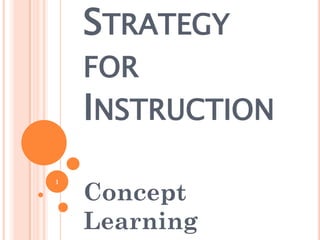
Concept Learning Strategies
- 1. STRATEGY FOR INSTRUCTION Concept 1 Learning
- 2. WHAT IS CONCEPT LEARNING? Concept Learning is defined as one of the intellectual skills, which involves the ability to apply knowledge across a variety of instances or circumstances. According to Merrill & Tennyson, (1977) a concept is a set of specific objects, symbols, or events which are grouped together on the basis of shared characteristics and which can be referenced by a particular name or symbol. Concrete and abstract are two different kinds of concepts learning. Concrete concepts are identify by their physical characteristics and abstract concepts fits a particular definition. 2
- 3. CONCEPT LEARNING Concept have both a declarative knowledge aspect and a procedural (intellectual skill) knowledge, patter recognition aspect (Tessmer, Wilson, & Driscoll, 1990). According to Klausmeir (1992), there are three kinds of concept attributes: intrinsic, functional, and relational. An intrinsic attribute of a concept is an “invariant” property of an observable thing. A functional attribute relates to how something works and what its use might be. Relational attribute is a quality a concept may possess define in terms of something else. 3
- 4. CONCEPT LEARNING The most critical prior knowledge in learning a concept is the knowledge of concepts that comprise the criterial attributes of characteristics of the concept. 4
- 5. Gagne identified discrimination, concrete concept, rule using and problem solving as four levels within the intellectual skills domain as his taxonomy. Problem Solving Rule Using Concrete concept Discrimination 5
- 6. STRUCTURES IN CONCEPT LEARNING Learners who has acquired a concepts are able to use that concept to classify previously unencountered instances as members of that concept class or not. Generalization and discrimination are two cognitive process that is required in learning a concept. When a learner is able to transfer a concept to settings other than the setting in which they had first encountered, it reveals that the learner has fully acquired the concept. 6
- 7. CONDITIONS OF LEARNING CONCEPTS The essential condition in a concept lesson or learning environment are the features that promote generalization and discrimination and reduce over- and under generalization. Inquiry and expository approaches are two main strategies for helping the learner to learn. An inquiry strategy is often referred to as an exploratory strategy, it presents examples and nonexamples of the concept and prompts the learners to induce or discover the concept. An expository approach present the concept, its label, and its criterial attributes earlier in the lesson sequence than in inquiry approach. 7
- 8. INQUIRY CYCLE Ask Reflect Investigate Discuss Create 8
- 9. INQUIRY CYCLE Ask – prior questions leading to content mastery Investigate – authentic materials; multiple sources & media Create – active, hands-on learning Discuss – collaboration, leaning through talk & writing Reflect – making sense of the process at the end The inquiry approach is a constructivist approach, which help develop problem -solving abilities. A lesson that is structured in an inquiry approach may not inform the learners of the specific purpose of the lesson at the beginning, but should be confirmed 9 within the summary and closure of the lesson so learners can clearly understand the purpose of the
- 10. LEARNING STRATEGIES Concept map, analogies, mnemonics, and imagery are useful strategy that learners may use in acquiring concepts during instructions. Question Concept learning can go wrong in two ways , learners can continue to over generalize. What strategy could be used to help a child who under generalize? 10
- 11. REFERENCE: Dewey, John. How We Think (Boston: Heath, 1910; London: Harrap, 1910); revised as How We Think, a Restatement of the Relation of Reflective Thinking to the Educative Process (Boston, New York & London: Heath, 1933; London: Harrap, 1933). Gagné, R.M. and Briggs, L.J. (1974). Principles of instructional design (2nd ed.). Holt, Rinehart, and Winston. Smith, P. L. & Ragan, T. J. (2005). Instructional Design (3rd ed.). Hoboken, NJ: John Wiley & Sons 11